Children Who Get Flu Vaccine 3 Times More Hospitalized for Flu

Flu vaccine (trivalent inactivated flu vaccine—TIV) has unknown effects on asthmatics, the Science Daily reported.
"The concerns that vaccination maybe associated with asthma exacerbations have been disproved with multiple studies in the past, but the vaccine's effectiveness has not been well-established," said Avni Joshi, M.D., of the Mayo Clinic in Rochester, MN. "This study was aimed at evaluating the effectiveness of the TIV in children overall, as well as the children with asthma, to prevent influenza-related hospitalization."
The CDC's Advisory Committee on Immunization Practices (ACIP) and the American Academy of Pediatrics (AAP) recommend annual influenza vaccination for all children aged six months to 18 years. The National Asthma Education and Prevention Program (3rd revision) also recommends annual flu vaccination of asthmatic children older than six months.
In order to determine whether the vaccine was effective in reducing the number of hospitalizations that all children, and especially the ones with asthma, faced over eight consecutive flu seasons, the researchers conducted a cohort study of 263 children who were evaluated at the Mayo Clinic in Minnesota from six months to 18 years of age, each of whom had had laboratory-confirmed influenza between 1996 to 2006. The investigators determined who had and had not received the flu vaccine, their asthma status and who did and did not require hospitalization. Records were reviewed for each subject with influenza-related illness for flu vaccination preceding the illness and hospitalization during that illness.
They found that children who had received the flu vaccine had three times the risk of hospitalization, as compared to children who had not received the vaccine. In asthmatic children, there was a significantly higher risk of hospitalization in subjects who received the TIV, as compared to those who did not (p= 0.006). But no other measured factors—such as insurance plans or severity of asthma—appeared to affect risk of hospitalization.
"While these findings do raise questions about the efficacy of the vaccine, they do not in fact implicate it as a cause of hospitalizations," said Dr. Joshi. "More studies are needed to assess not only the immunogenicity, but also the efficacy of different influenza vaccines in asthmatic subjects."
4155/v





















